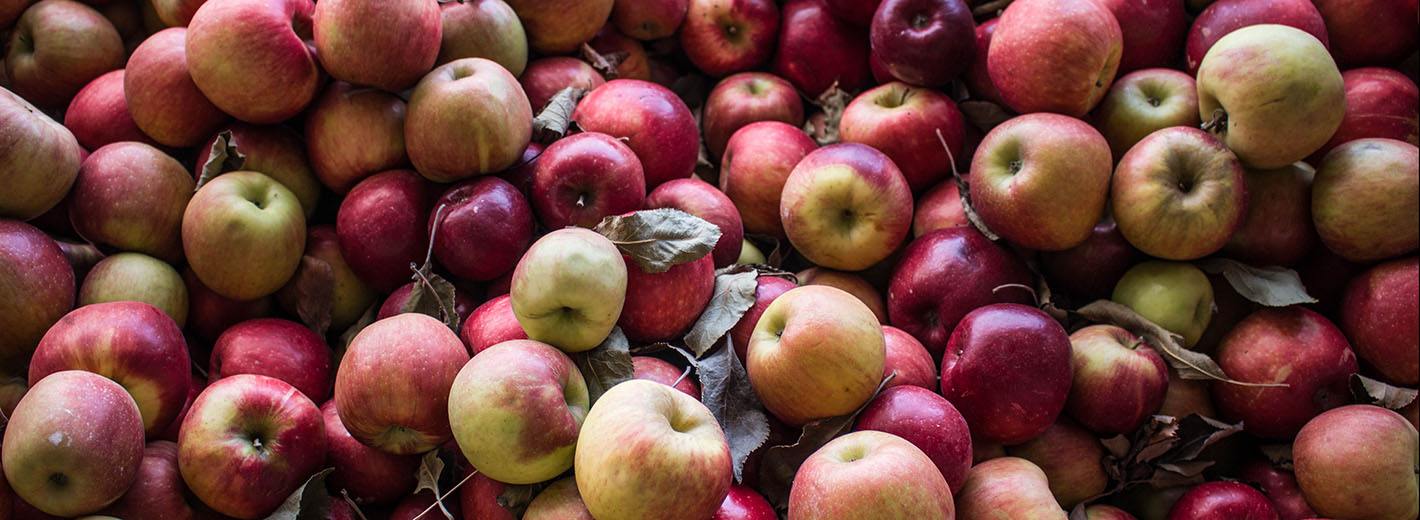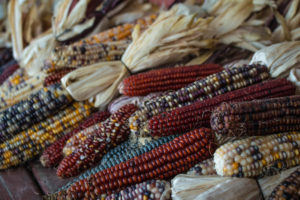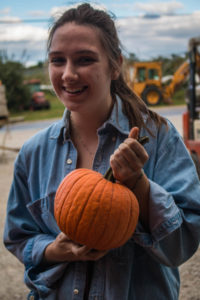
Lessons from a Seasoned Farm to Fork Partner
Apples were my introduction to seasonality. Growing up, the only time my family left the suburbs to taste foods straight from the farm was autumn apple picking.
These apples clearly tasted better, and I understood they were temporal. But beyond the hayrides and corn mazes, I never saw the farmers who raised the apples, or heard their stories. Now my job as a Fellow is to connect students with the people who grow our food, so I was excited to join Oberlin College students on a tour of Farm to Fork partner Miller Orchard in Amherst, not far from the campus in Oberlin, OH.

Miller’s Orchard also grows heritage corn
Miller Orchards is a rare fourth-generation farm, one that has stood the test of time since the 1860s. Brothers David and Roger Miller own and run the farm along with their families. The Millers currently grow a variety of apples, pears, peaches, and cherries as well as pumpkins, relying on integrated pest-management practices to minimize pesticide use. They also plant acres of corn, soybeans, and hay for supplemental income, plus host a trip of goats just for fun. (Yes, that’s what you call a herd of goats! They are trippy animals.)
Farmer David Miller walked us through his storage shed, filled with bins of recently hand-picked pumpkins and a walk-in cooler of apples. We learned that conventional apples may have been in cold storage for as long as 12 months before they make it to consumers. Miller Orchard apples do not have the same shelf life, although that varies considerably by variety. Some apples need to be eaten within a matter of weeks, others can stand a few months in the cooler.

Oberlin student and Real Food Challenge Intern Sophia Maffie with a Miller’s Orchard pumpkin
The orchard business functions on a different time scale from other types of agriculture in other ways. Unlike annual crops such as corn, pumpkins, or squash, fruit trees are a multiyear investment that require long-term planning. When the Millers want to offer a new apple variety, it will take five years from nursery growth to first crop before they can bring that apple to market. So jumping on the latest trendy apple flavor can be a risk — in five years, consumers may have moved on to a different apple.
In addition to selling direct to Oberlin and at their farm storefront, the Millers sell apples through a local produce auction. But their market is limited compared to larger growers, particularly because they do not wax their apples, which means they cannot sell to some major retailers.
During the last leg of our tour, David spoke to some of the current challenges he faces. He has noticed changing weather patterns and shifting seasons on some of his crops. This was the first year in the past four that he had a solid peach crop, as more fruits have been lost due to early warming and premature blooming followed by frost. And in 2016 and 2015, drought left the Millers with only 50 and 30 percent, respectively, of their usual apple yields. The Food Safety Modernization Act and labor shortages have also made his business harder.
Yet David was optimistic about this year’s harvest and the future of the farm. He has hopes that his children will stay on, working the land that has been in his family for more than 150 years. He even keeps an eye on certain grandchildren who seem to have the farming gene.
In the end, Oberlin students left with some gourds, hot cider, Honeycrisp apples, and a much deeper understanding of the modern issues facing American agriculture.